Faculty Job: Myths & Realities – an interview with Christopher Muir
About you
Describe your journey from student to newly appointed faculty
I was an undergraduate at William and Mary in Virginia and did an honors thesis with fruit flies in George Gilchrist’s lab. I spent two amazing summers as an NSF REU and then summer technician at Rocky Mountain Biological Lab in Colorado working with Diane Campbell and her lab. Annie Schmitt and her then-postdoc Amity Wilczek hired me as a postbaccalaureate research assistant in Germany between undergrad and starting my PhD program at Indiana University with Leonie Moyle. I did a ~3.5 year postdoc at the University of British Columbia, mostly with Amy Angert, but I also had the pleasure to collaborate with Sally Otto and Matt Pennell. Somewhat unusually for my field, I also worked for 4 months as a computational biologist for a consulting company, then one year in biotech at a company called Novozymes.
What inspired you most to pursue your current career?
My parents fostered a love of nature and academic excellence. I felt like I should be a great naturalist who spent their days outdoors and could identify every species. I later realized and eventually accepted this wasn’t really my strength. I’ve always been fascinated by evolution because it asks the most fundamental unanswered questions. Early in college I thought I wanted to be a chemist until I learned that the periodic table had been derived from quantum mechanics, which told me (perhaps naively) that all the major problems had been solved. Biology seemed much more open and fit with the vision of myself as a naturalist. Later in college and grad school I also discovered that statistics and other quantitative approaches come easily to me and I really enjoy them. Finally, in the middle of grad school I discovered, to the consternation of my advisor, that plant physiology was fascinating and scratched my itch for reductionism. That path of self-discovery and acceptance has led me to where I am now.
What is the major focus of you research team?
I would like to predict fitness landscapes from fundamental physical and chemical principles. This would allow us to answer basic questions like: How well are organisms adapted to their environment? Are there unfilled areas of phenotypic space that are fit but haven’t evolved? Leaf physiology is a great system for these questions. There are many absolutely fascinating structure-function relationships that have well understood physicochemical bases and are mathematically tractable. Right now I’m focusing on stomata, internal leaf anatomy, and photosynthetic traits using both modeling and comparative approaches. In the future, I want to use populational approaches to measure selection on these traits in natural conditions. I went into plant biology because of their experimental tractability – you can stick them in the ground, walk away, and come back to measure their fitness. So I’m looking to develop a system in Hawai’i to use leaf physiology as a tool for understanding adaptation within and between species. Stay tuned.
Which conferences do you regularly attend?
In the past I mostly attended Evolution, occasionally Botany and the American Naturalist standalone meeting. Going forward, I’ll focus on Society for Integrative and Comparative Biology (SICB) as I am Secretary of the new Botany Division there. I will also keep my eye out for smaller, more focused meetings such as New Phytologist Symposia.
Next meeting:
Gordon Research Conference: CO2 Assimilation in Plants from Genome to Biome
June 9-14, 2019
Who are your current collaborators?
Evolutionary Physiology of wild tomatoes
Jeroni Galmés, Miquel À. Conesa
Research Group on Plants Biology under Mediterranean Conditions. Departament de Biologia, INAGEA, Universitat de les Illes Balears
Local adaptation in monkeyflowers
Amy Angert – Department of Botany and Zoology, University of British Columbia
Seema Sheth – Department of Plant and Microbial Biology, North Carolina State University
Phylogenetic comparative methods for photosynthetic evolution
Matt Pennell – Department of Zoology, University of British Columbia
Can mutualists increase pathogenicity in tritrophic interactions?
Sally Otto – Department of Zoology, University of British Columbia
CO2 and water transport in leaves (pending grant support…)
Tom Buckley, Matthew Gilbert, Andrew McElrone, Beth Forrestel
University of California, Davis
Guillaume Théroux-Rancourt
Intsitut für Botanik, BOKU Wien
About your job hunt
How long did it take you from the beginning of searching faculty jobs to get one?
~5 years (Fall 2013 to Summer 2018). For reference, I received my PhD in June 2013.
2013 – a few academic applications
2014 – many applications (all academic)
2015 – many applications (all academic)
2016 – many applications (all academic)
2017 – many applications, accepted job in industry
2018 – a few academic applications
During your job hunt, what did you learn about yourself or about the process of finding an academic job?
My job hunt was…fraught, for reasons I won’t elaborate on here. I did not enjoy the academic job market and hope I can make positive changes, at least in my department. The process reinforced some things I knew about myself and taught me new things, both positive and negative.
Reinforced – I love scientific research. I know it sounds egotistical and quixotic, but the job search reinforced my commitment to pursue fundamental questions I find inherently fascinating rather than trying to chase the latest fad. I decided early on I’d rather fail pursuing what I love than succeed doing what was expedient for my career.
Positives – I become more grateful to my family, mentors, and peers who stood by me even when I wasn’t very pleasant to be around. I got over imposter syndrome. I had many interviews and many rejections, but it became obvious these decisions were most often not about other scientists being better or worse than me. I learned grace in accepting professional praise. I became more empathetic to those struggling to achieve their own goals.
Negatives – I “learned” to feel bitter and resentful, which I’d never felt much before because I’d always been pretty successful and never really had a reason to. I wish I had coped with rejection better. I also became much more cynical about the motivations of universities and academic departments. My opinion of deans diminished significantly.
Based on your experiences and the feedback you got during the job search, what do you think are key skills and accomplishments that a successful candidate must demonstrate?
This list is incomplete and specific to research-intensive jobs. I have broken it down by what I perceive as correctly valued, overvalued, and undervalued items
Correctly valued:
Papers and grants: These aren’t decisive factors at the margin, but there is absolutely a minimum threshold below which a candidate will not even be considered. Get funding for your work and communicate it.
Independence: A good researcher needs to conceive of an original idea, figure out how to test it, and implement a plan.
An interesting, but answerable question: There are more boring questions than we will ever answer, and some very interesting questions that can never be answered. Make sure you are asking something interesting that can actually be answered.
Communication: A good idea that can’t be communicated to others is not very useful. The flipside is that mediocre ideas well communicated get too much attention. Regardless, communicating effectively in multiple formats is extremely useful.
Overvalued:
Speed: Candidates get dinged for not doing enough during their postdoc. This perversely incentivizes people to either get data from their advisor or choose to pursue topics that yield a quick result rather than what is most important.
Journal Impact Factor: I don’t have anything new to add here, this is a widely understood problem that nevertheless persists.
Moving the field forward: Over and over, I heard something along the lines of “It might be flawed, but it moves the field forward” as an excuse for candidates who presented sexy results based on poorly designed or analyzed research. What’s the point of “moving the field forward” if it’s in the wrong direction or the destination is just more bad science?
Undervalued:
Logic and evidence: Assuming the scientific question is interesting, the next thing I want to know about someone’s research is whether their conclusions logically follow from their data. Yet very little discussion I heard about job candidates focused on this essential skill. Most people excuse this by saying that they aren’t experts in that field and it made it through peer review, so it must be OK. This is obviously wrong. Peer review is not a panacea. You don’t have to be an expert to reasonably evaluate whether conclusions logically follow from evidence if the research is explained well.
Which published paper was the most influential for your career or getting the faculty job?
Muir CD (2015) Making pore choices: repeated regime shifts in stomatal ratio. Proceedings B: 282(1813) 20151498.
Advice for job applicants
Beyond your research and publications, how did you prepare for the academic job hunt during your postdoc?
Read widely and go to seminars: It’s obvious when you meet people that never go outside their intellectual echo chamber. Attend every job seminar and chalk talk in your field (broadly speaking) that you can.
See the other side: Ask to get on search committees, faculty meetings discussing candidates, grant review panels, etc. I did not do as much of this as I should have.
Network: I didn’t end up at an institution where I knew faculty in advance, but I believe personal connections helped me get interviews at others.
Self-reflection: In your statements and during interviews you have to explain yourself, your motivations, reasoning, and thought process. You can’t explain yourself to others until you know yourself.
Seek advice widely: Different people have strongly held and diametrically opposed opinions about interviewing. Focus on the common elements in all the advice you get, as this is probably useful. Note idiosyncratic opinions that may be strongly held by a vocal minority. Decide for yourself when advice conflicts.
How did you prepare for the actual job hunt? How did you identify potential opportunities, prepare your application materials, and prepare for interviews?
Practice: Some scientists are naturally gifted communicators and interlocutors, but most aren’t, so you have to practice how to clearly communicate your accomplishments and ideas. This goes for research seminar, chalk talk, Q&A with search committees, and individual meetings.
Get feedback early and often: Practice in front of a diverse audience. Let others read and critique your application materials.
Be yourself: You’ve probably heard this before, but it’s worth repeating. Most of us are not gifted actors, so pretending to be something we’re not is generally ineffective.
To paraphrase George Orwell, ignore any of this advice sooner than do anything outright barbarous.
Some resources focused on research-intensive ecology/evolution jobs.
https://www.dartmouth.edu/~mpayres/teaching/gradprogram/job-quest.pdf
https://dynamicecology.wordpress.com/
https://github.com/RILAB/statements
https://www.amazon.com/Chicago-Landing-Academic-Biology-Guides/dp/0226101304
About you as a faculty member
What were the initial challenges to starting your own lab?
I opted to teach my first semester, which is concluding shortly, and focus on purely computational projects that wouldn’t involve new equipment or personnel. So I haven’t done much organizing or hiring yet, though it will begin soon. Submitting my first grant was (administratively) more challenging than I would have liked, but at least now I know the system. The biggest challenge for me at the moment is budgeting – how should I spend scarce resources to make sure I get data but not overspend early?
What qualities do you look for when recruiting for your lab?
This answer will probably change as I gain experience, but right now I’m looking for broad biological interests and good quantitative skills. I find people with really narrow scientific interests boring and I have high standards about engaging with theory and rigorous data analysis. I don’t think I would effectively mentor students who didn’t share those values.
How do you manage “work-life balance” as a faculty?
Observationally, there are a broad array of equally successful people that have very different work-life balance strategies, so I don’t think my advice is especially useful. I once read something to the effect of “Make a list of the 20 things you want to accomplish in life and assiduously avoid all but the top 3.” I haven’t actually made such a list, but I use this idea as a guide. There are many things I’d like to do well at work and at home, but there will never be enough time. So I’ve picked ~3 lab projects I focus on, I do trail runs as much as I can, I try a couple new dinner recipes each week, and I try to plan outdoor activities with my family. If I can accomplish all those on a regular basis, then I’m satisfied. If there’s a time leftover, I fill it at random with basically no planning whatsoever.
Whom do you like to thank for supporting and inspiring you along this journey?
I’m sure I’ll forget someone, but here goes.
My parents instilled love of the outdoors and academic excellence.
My high school chemistry and biology teachers at South Lakes High School, Ryan Stattenfield and Pam Sol, engaged my scientific interest with challenging courses that put me way ahead of my peers when I arrived at William and Mary.
My undergraduate mentor at the College of William and Mary, George Gilchrist (now at NSF), made a large impact on my thinking. Even though I work on plants rather than flies now, I don’t think my broad interests have shifted dramatically.
The Rocky Mountain Biological Laboratory (especially Ian Billick, George Aldridge, and Diane Campbell) for two amazing summers of field research opportunities.
Annie Schmitt (UC Davis) and Amity Wilczek (Deep Springs College) for getting me into plant evolution and giving me the opportunity to work abroad in Germany.
Leonie Moyle (PhD advisor, Indiana University) provided an amazing intellectual atmosphere and lots of flexibility in developing my PhD, as well as great professional development. A committee member, Matt Hahn (Indiana University) was also very supportive.
I thank Peter Zee (now at Ole Miss), Yogis Bar and Grill, and Bell’s Two Hearted Ale, and Bloomington Area Runners Association for getting me through grad school.
My postdoc mentors at UBC (Amy Angert, Sally Otto, Matt Pennell) are amazingly gifted and inspiring researchers. I love talking about science with them and they provided many kinds of support through the travails of the academic job search.
Colleagues at other jobs (Joe Thorley at Poisson Consulting, Cory Solheim and Lee West at Novozymes) gave me opportunities to work in different fields that I enjoyed and learned a lot from, though I feel like I let them down by leaving.
My wife Emily Gercke and I have been together through all of this since undergrad at William and Mary. She’s been there for highs and lows, from Virginia to Indiana to Vancouver to North Carolina to Hawai’i. I’ll always be indebted for her love and support.
If prospective students and postdocs want to reach you, where can they contact you and read about your work?
Email: [email protected]
Website: www.chrisdmuir.com
Twitter: @thegoodphyte




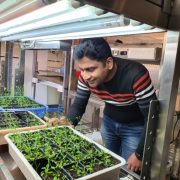
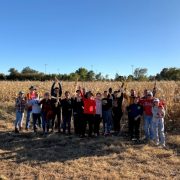
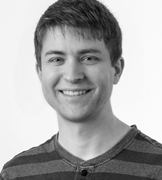
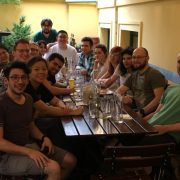
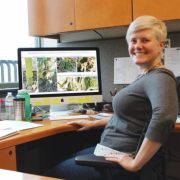
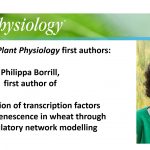

Leave a Reply
Want to join the discussion?Feel free to contribute!